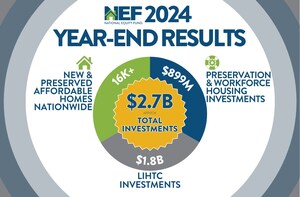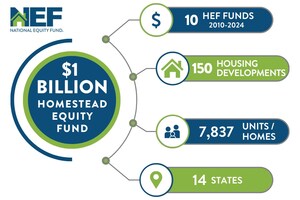NEF announces $1.5B in 2020 affordable housing investments
Record activity helped expand and preserve rental housing, tackle racial and socio-economic barriers and bolster local economies during pandemic
CHICAGO, Feb. 23, 2021 /PRNewswire/ -- National Equity Fund, Inc. (NEF) announced today that it made more affordable housing investments in 2020 than at any time in its 33-year history, helping local housing providers keep development plans on track during the pandemic while also bolstering jobs and income in hard-hit communities.
All told, NEF invested $1.5 billion for the year, including more than $1 billion in equity for Low Income Housing Tax Credit (LIHTC) developments and $420 million in loans to finance affordable housing preservation efforts. Other activity for the year includes Opportunity Zones investments to fuel workforce housing, pre-development loans to help a range of new developments move forward and grants to help housing providers implement health measures to protect their staff and residents against COVID-19. Combined, those efforts are supporting more than 13,240 units of affordable housing nationwide, along with an estimated 16,200 jobs.
Based on its strong 2020 results, NEF will make a $14.6 million grant to the Local Initiatives Support Corporation (LISC) to support wide-ranging work focused on economic development, education, health, safety and jobs.
"I can't think of a time when affordable housing has been more important to our communities or our national economy," said Matthew Reilein, NEF president and CEO. "It is a public health imperative, serving as a bulwark against the coronavirus. It creates jobs and boosts local income in the midst of a recession. And it is a core component of racial and economic justice, helping reduce inequality so that millions of people can build a good quality of life."
In 2020, NEF continued to grow its business beyond its traditional LIHTC investments to encompass a range of housing finance solutions. "We are leveraging our core competencies to help expand access to affordable housing and working on the policy front to protect long-term affordability. That will continue to be critical in 2021 and beyond," Reilein said.
He also pointed to new initiatives that reflect NEF's broad mission, its close connection to communities, and its long-standing commitment to racial and economic justice. For instance, NEF rolled out the $100 million Emerging Minority Developer's Fund (EMDF) in the fourth quarter of 2020, with the fund's first project closings expected in the coming months. "EMDF is helping build the next generation of developers while also deepening the impact of affordable housing capital—delivering financing to projects and communities that otherwise might not be able to fuel the development they need."
NEF is also expanding its programs to help development partners, investors and municipalities manage their affordable housing portfolios and build strategies that catalyze opportunity for residents.
"The reality is that there is a lot of uncertainty in the world right now," Reilein said. "Those of us with long histories of mission-driven investing need to be creative. We need to build on what we've learned, test new approaches and create new tools to meet the needs of families and communities."
About NEF
National Equity Fund, Inc., based in Chicago, is a nonprofit affordable housing investor and one of the nation's largest syndicators of federal Low Income Housing Tax Credits. Since 1987, NEF has invested nearly $18.3 billion in more than 2,900 developments, supporting 200,500 affordable homes and fueling nearly 245,000 jobs nationwide. NEF is an affiliate of the nonprofit Local Initiatives Support Corporation (LISC) and has made more than $196 million in grants to support LISC's broad-based community investment efforts throughout the country. For more information, visit www.nefinc.org.
Media contact:
Colleen Mulcahy, for NEF
312-342-8244
[email protected]
SOURCE National Equity Fund

Related Links
WANT YOUR COMPANY'S NEWS FEATURED ON PRNEWSWIRE.COM?
Newsrooms &
Influencers
Digital Media
Outlets
Journalists
Opted In






Share this article